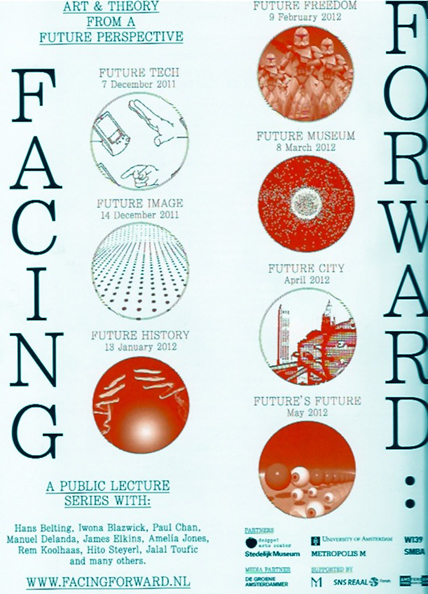 Debat: Future Museums (8 maart 2012) van de lezingenserie Facing Forward georganiseerd door het Stedelijk Museum, Universiteit van Amsterdam, de Appel arts centre, W139, Stedelijk Museum Bureau Amsterdam en Metropolis M.
Debat: Future Museums (8 maart 2012) van de lezingenserie Facing Forward georganiseerd door het Stedelijk Museum, Universiteit van Amsterdam, de Appel arts centre, W139, Stedelijk Museum Bureau Amsterdam en Metropolis M. Lecture: Future Museums
The position, function, scope, and character of the modern and contemporary art museum was defined in a drastically new way by the critical practices of conceptual artists in the 1960s and 1970s. The institutional criticisms which emerged in the 1980s also raised questions which made the future of the museum as an institution increasingly uncertain. Where will art belong in the future? Will it still have a place in the museum? And where will the museum belong, considering the public and context? Or is the utopian art institute a museum that is truly global and public, so that we can no longer talk in terms of a sense of “belonging”?
The future is not always rosy. In the Netherlands and other parts of Europe, museums and contemporary art institutes are currently facing drastic spending cuts which will force them — in the most ideal case, if they do not disappear altogether — to think of new institutional strategies and methods. If the museum of the future will soon be organized completely differently, if the four walls of the “white cube” are broken down and museums begin to function extra muros, what will the new theory of the art institute look like? What institutional, futuristic concepts do we need to deal with these sorts of changes?
The speakers of this evening are art historian Hans Belting (DE), who will be interviewed by the moderator, and curator Iwona Blazwick (UK). Following the two presentations, there will be a debate with experts and the public, moderated by Rein Wolfs (DE), Director of Kunsthalle Fridericianum in Kassel. Natasha Ginwala (IN/NL), Amsterdam-based curator and critic, will provide an introduction statement.
- Facing Forward
Links
Museology /